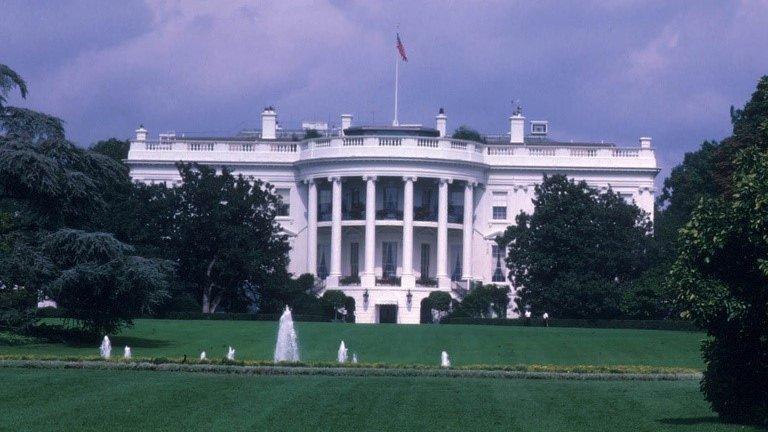Rand Paul and his Ron Paul conundrum
- Published
- comments
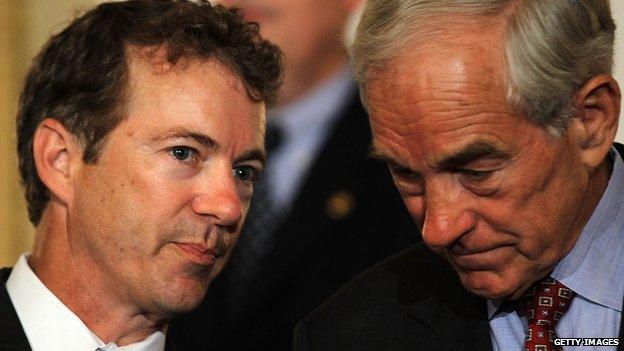
Will Ron Paul's campaign donor base embrace Rand Paul?
Kentucky Senator Rand Paul has a Ron Paul problem. Or maybe it's a Ron Paul opportunity.
Both sides of that particular coin were on display Friday, when Ron - Rand's father - spoke to the International Students for Liberty Conference in Washington, DC.
It was the elder Paul's kind of audience - young and enthusiastic about the libertarian emphasis on robust individual freedoms and miniscule government. Crowds like this had fervently supported the former congressman's quixotic bids for the Republican presidential nomination in 2008 and 2012, where he proved to be a pesky participant in the debates and a headache for local party structures, but a lesser threat when ballots were counted.
Now the question is whether a crowd like this will pass their support on to Paul's son - and whether the price of that support will put the senator at risk of alienating a larger, more important part of the Republican base.
Ron Paul on Friday night was in prime form. He railed against the US Federal Reserve, condemned government spending on both social programmes and the military, and criticised a US foreign policy he sees as overly interventionist.
His positions were well known and generally embraced by the audience. They chanted "ban the Fed" at the former congressman's prompting and applauded when he said that if the US cared about liberty, it would "bring our troops home and deal with our problems here".
But those aren't the kind of opinions that will fly with many Republican primary voters, who are more pro-intervention when it comes US foreign policy and look askance at Mr Paul's tirades against corporate power, calls for a return to the gold standard and dalliances with the secession movement, external.
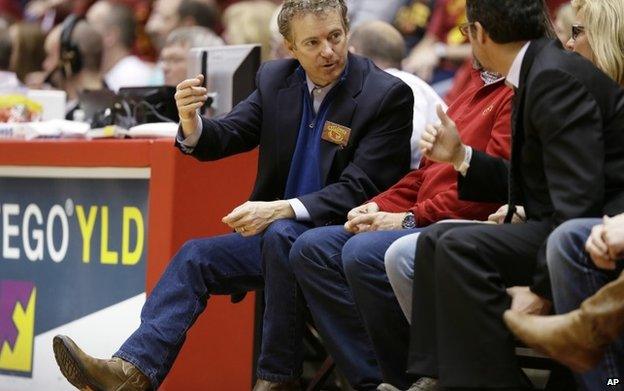
"If Rand Paul wants a chance in 2016, he has to convince his father to zip it," writes, external the Federalist's Robert Tracinski, noting that the elder Mr Paul's recent statements on foreign policy "are absurd on a number of levels".
Rand Paul has, in fact, backed away from many of his father's foreign policy positions. He's called for US air strikes against the Islamic State in Syria and Iraq and condemned Russia's annexation of Crimea. While he wants an independent audit of the Federal Reserve, he's not part of the "ban the Fed" gang.
Civil liberties issues are probably where he's most in line with the Ron Paul supporters, and his marathon filibuster against President Barack Obama's drone policies in March 2013 and condemnation of civil forfeiture laws and police militarisation continue to win their favour.
Among the crowd of die-hard members of the Ron Paul "revolution," who lined up by the hundreds for a chance to be photographed with the former congressman, the reviews of the son were generally supportive - but with some concerns.
"Without a doubt, Rand Paul is my number-one guy," says University of North Carolina-Charlotte student Michael Przybyl.
"Ron Paul, in my opinion, is more extreme in a good way, but unfortunately in less of an electable way," he continues. "Whereas we see with Rand Paul, he's a little bit more relaxed on certain issues, drawing in some moderate voters and can be more of a realistic candidate for the White House."
For Renee Kate and Ann Leverette, however, the younger Paul is an apple that has fallen too far from the tree.
"I don't think his views correspond with his father's," says Leverette, who hosts a New Hampshire-based libertarian podcast with Kate called Seditious Sirens. "I don't feel he's as liberty-oriented. He's definitely more on the conservative side."
Kate says she hopes Rand Paul is just soft-selling his father's positions to appeal to a broader audience, but it's "not looking good".
"I definitely wouldn't be voting for Rand," she adds.
The elder Paul's stands on the issues won't be the only possible pitfall for the son's campaign, however. Questions of intolerance have dogged the congressman ever since his 2012 race, when reporters discovered copies of his libertarian newsletter from the 1980s and 1990s that contained white supremacist writings.
Those concerns once again surfaced on Friday night, when Mackenzie Holst, a student from Texas Christian University, used the evening's question-and-answers session to ask Mr Paul to repudiate the "racist, sexist and homophobic" views expressed in his newsletter.

Possible 2016 opponents
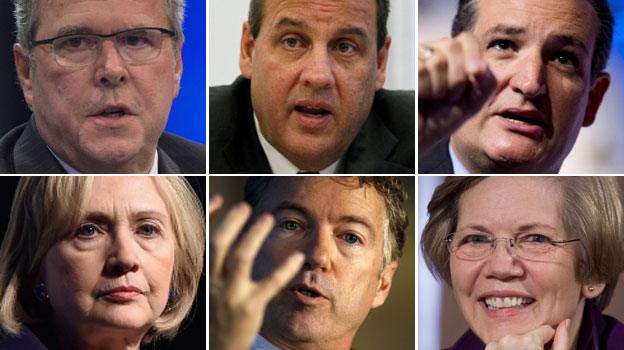
Clockwise from top left: Jeb Bush, Chris Christie, Ted Cruz, Elizabeth Warren, Rand Paul, Hillary Clinton
No-one has formally declared but these are some of the names to watch:
early Republican frontrunner is Jeb Bush
but New Jersey Governor Chris Christie could battle Bush for the party's centre ground
darling of the Tea Party is Texas Senator Ted Cruz
firebrand liberal Elizabeth Warren is championed by many in the Democratic Party
libertarian Rand Paul has his supporters - and enemies - among Republicans
Hillary Clinton will have learnt much from her failed campaign of 2008

The audience responded with boos, and Mr Paul said he doesn't keep the newsletters in his office and didn't author of any of the essays.
That wasn't adequate for Ms Holst, who told the BBC that the "second generation" of young libertarians that attended the conference needs to firmly renounce past discrimination in the movement.
"We need to be inclusive, we need to condemn racism, and we need to condemn sexism," she said. "And when the icon of the libertarian movement does not do those things, we cannot just stand by and let that happen."
She added that she does not hold Ron Paul's views against his son, however. "I don't think his reputation should hinge on that of his father's," she said.

Mackenzie Holst says Ron Paul should condemn racist views in his newsletter
Rand Paul can only hope that it's a sentiment shared by a wide enough swath of Republican primary voters to give him a realistic shot at winning the nomination. So far, the results are inconclusive.
According to the latest polls, external, Mr Paul is pulling anywhere in the high single digits to mid-teens both in the early voting states of Iowa and New Hampshire, as well as nationally. Those numbers are comparable to those his father garnered in 2012. He secured 21% in a third-place Iowa finish and 23% in New Hampshire for second, but was never able to break through with any wins.
Can the younger Paul be different? If familial concerns are an issue, at least in this Republican field he's far from alone.
Texas Senator Ted Cruz has had to grapple with questions concerning his outspoken father, external, a Cuban immigrant who has called President Barack Obama a Marxist who should be sent "back to Kenya". Former Governor Jeb Bush has a former president for a father - but it's his brother's presidency, with a record of war and financial collapse, that casts a more ominous shadow.
What's clear from this weekend's Students for Liberty convention is that there's still a lot of love for Ron Paul among a younger generation that, as it did for Barack Obama in 2008, can become essential footsoldiers for a powerful grass-roots campaign.
The elder Paul also boasts a nationwide fundraising base that can draw from a pool of donors that are beyond the reach of most other candidates. Ron Paul raised $35m (£22.8m) in 2008 and more than $40m in 2012 - astounding numbers for a so-called fringe candidate.
Rand Paul's goal, then is to capitalise on this devotion as much as he can while still appealing to the rank-and-file Republican primary voter.
Toward the end of his session, the moderator asked Ron Paul if he included his son among the "top three" candidates he was considering supporting.
"I'm seriously thinking about it," Paul replied as the audience laughed. "I'm studying his record."
While the elder Paul may have been speaking in jest, his son's record - as well as how closely he hews to his father's political idiosyncrasies - could make or break Rand Paul's campaign.
It's a fine line to walk if he wants to be more than another presidential primary footnote alongside his father.
- Published16 April 2014
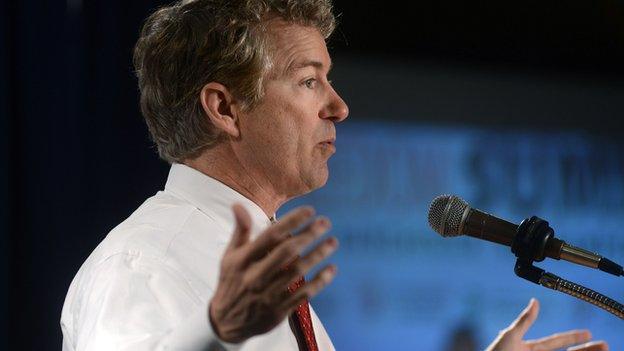
- Published3 February 2015
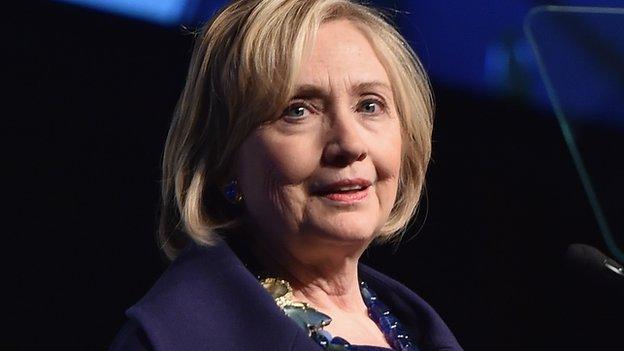
- Published16 March 2016
